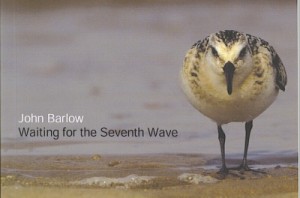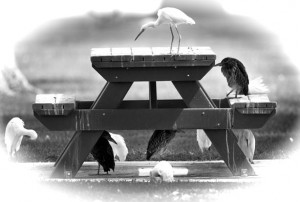 With the QE2 going into retirement later this year, the UK needs a grand new symbol of British culture and craft, and of its ties to far-flung shores. Snapshot Press may have found the answer, with the launching, on September 18, 2008, of the monumental Wing Beats: British Birds in Haiku (ISBN 978-1-903543-24-5; to order). The 320-page volume features 323 experiential haiku and 131 species of British birds. It is written and compiled by John Barlow and Matthew Paul (with haiku by 30 additional poets, such as f/k/a’s Guest Matt Morden), and has photographic-watercolor illustrations by Sean Gray, plus a foreword by BBC’s naturalist Stephen Moss.
With the QE2 going into retirement later this year, the UK needs a grand new symbol of British culture and craft, and of its ties to far-flung shores. Snapshot Press may have found the answer, with the launching, on September 18, 2008, of the monumental Wing Beats: British Birds in Haiku (ISBN 978-1-903543-24-5; to order). The 320-page volume features 323 experiential haiku and 131 species of British birds. It is written and compiled by John Barlow and Matthew Paul (with haiku by 30 additional poets, such as f/k/a’s Guest Matt Morden), and has photographic-watercolor illustrations by Sean Gray, plus a foreword by BBC’s naturalist Stephen Moss.
![]() Wing Beats, with its extensive texts that “explore both British avifauna and the history and intricacies of haiku poetry, considering the relationships between these in a global context,” might do for birding and haiku what Cor van den Heuvel’s Baseball Haiku did last year to link the American past-time with the poetic genre — by demonstrating their natural affinity, turn haiku fans into lovers of birds and birders into lovers of haiku.
Wing Beats, with its extensive texts that “explore both British avifauna and the history and intricacies of haiku poetry, considering the relationships between these in a global context,” might do for birding and haiku what Cor van den Heuvel’s Baseball Haiku did last year to link the American past-time with the poetic genre — by demonstrating their natural affinity, turn haiku fans into lovers of birds and birders into lovers of haiku.
In the Forward, the Stephen Moss says, ‘The poems in this volume are worthy heirs to three great traditions: the British love of nature, especially birds; the poetic approach of John Clare, rooted in observation and reality but taking the reader to a higher plane; and finally, of course, the long and venerable tradition of haiku. Similarly, haiku poet, editor and author William J. Higginson says:
 “In Wing Beats, the brief, Japanese-style haiku becomes an absolutely first-rate medium for capturing those fleeting moments all bird-lovers prize. The birds in these poems glide, poke, and zip across the many different landscapes of Britain, punctuating the wind and the sounds of human activity. Substantial appendices discuss how experience and tradition combine to freshen our understanding of the seasons in haiku. I find Wing Beats full of acute observations, artistically moving, and intellectually stimulating—a very important book.”
“In Wing Beats, the brief, Japanese-style haiku becomes an absolutely first-rate medium for capturing those fleeting moments all bird-lovers prize. The birds in these poems glide, poke, and zip across the many different landscapes of Britain, punctuating the wind and the sounds of human activity. Substantial appendices discuss how experience and tradition combine to freshen our understanding of the seasons in haiku. I find Wing Beats full of acute observations, artistically moving, and intellectually stimulating—a very important book.”
storm bands . . .
the gathered rooks scatter
this way and that
still water
only the wing beats
of the circling curlews
… by John Barlow – Wing Beats (Snapshot Press, Sept. 2008) 
“storm bands” Magnapoets 1; “still water” Simply Haiku 5:2
You can find a few additional sample poems by John Barlow from Wing Beats (and also five by Matthew Paul), here. In addition, a couple dozen of John Barlow’s avian haiku are featured in an online exhibition at 3LightsGallery, titled “The Bittern’s Neck” (April 2008), and many will appear in Wing Beats.
 Despite his ties to Wing Beats — as co-author, editor, and publisher — the f/k/a Gang wants you to know that John Barlow’s haiku oeuvre is not solely focused on birds. John’s first book-length collection of haiku, “Waiting for the Seventh Wave” (Snapshot Press, 2006; order form; reviewed in Modern Haiku Vol. 39.1) shows the diversity of his subjects, styles and moods. Yes, there’s a bird on the cover of Seventh Wave, and quite a few bird-ku inside. But, you’ll also find some delightful birdless haiku and senryu throughout the volume — allowing even indoorsy Yankees to relate to poem after poem, without the assistance of an Birders’ Guide (or even a British-to-American English dictionary).
Despite his ties to Wing Beats — as co-author, editor, and publisher — the f/k/a Gang wants you to know that John Barlow’s haiku oeuvre is not solely focused on birds. John’s first book-length collection of haiku, “Waiting for the Seventh Wave” (Snapshot Press, 2006; order form; reviewed in Modern Haiku Vol. 39.1) shows the diversity of his subjects, styles and moods. Yes, there’s a bird on the cover of Seventh Wave, and quite a few bird-ku inside. But, you’ll also find some delightful birdless haiku and senryu throughout the volume — allowing even indoorsy Yankees to relate to poem after poem, without the assistance of an Birders’ Guide (or even a British-to-American English dictionary).
Indeed, I enjoyed so many of John’s little gems, that I’m going to simply open the book at random and share the first few bird-free poems I find:
early morning —
the cat’s tail
circles the bed
after a day
of arguments __
night rain
train delays
for the fifth day now
the dead fieldmouse
morning breeze
through the sunlit flat
her perfume lingers
. . . by John Barlow – Waiting for the Seventh Wave (Snapshot Press 2006) 
You’ll find more poems from Seventh Wave in Michael Dylan Welch’s Modern Haiku Review, which also takes a long look at Matthew Paul’s The Regulars (Snapshot Press, 2006). We wish John and Matthew the best of luck with the launch of their much-anticipated project of love, Wing Beats.
 afterwords (Aug. 25, 2008). Egrets, They’ve Got a Few: Talk about too much of a good thing. Two years ago, Heather Watts of Willows, California, thought “Wow!” when snowy egrets began arriving at their local park. “But now we just want them gone,” she says. According to the L.A. Times (“Egrets ruffle feathers,” Aug. 14, 2008; via the Don Weeks’ Show and L.A. Now weblog):
afterwords (Aug. 25, 2008). Egrets, They’ve Got a Few: Talk about too much of a good thing. Two years ago, Heather Watts of Willows, California, thought “Wow!” when snowy egrets began arriving at their local park. “But now we just want them gone,” she says. According to the L.A. Times (“Egrets ruffle feathers,” Aug. 14, 2008; via the Don Weeks’ Show and L.A. Now weblog):
 “More than 1,000 birds are nesting there, turning patches of lawn a lunar gray and showering the grass with broken shells and feathers. Officials say their guano is slowly killing 60-foot redwoods and pines.”
“More than 1,000 birds are nesting there, turning patches of lawn a lunar gray and showering the grass with broken shells and feathers. Officials say their guano is slowly killing 60-foot redwoods and pines.”
The LAT article has more of the gruesome details, and tells of efforts to move the egrets from the park, plus some amazing and revealing photos. I don’t know whether this Egret Invasion has inspired many haiku, but a similar episode with Canadian Geese right across the Mohawk River from me, in Scotia, NY, provoked my second haibun, “bad for the gander” (May 31, 2006).
early March –
the weather vane goose
still heading south
winter gale –
crows flying farther
than the crow flies
rubbernecking
the sunset geese –
our tailgater honks
a young cop rousts
the trestle couple—
cooing pigeons
…. by David Giacalone
“early March” & “winter gale” – Simply Haiku (Autumn 2006, Vol. 4 no. 3)
“rubbernecking” – tinywords – December 12, 2006
“a young cop rousts” – from the rengay “The Unmade Bed,” (Lynx XXII:3, October 2007)
at our pond
the geese you shooed
from your pond……. by dagosan (dagosan’s haiku diary, June 11, 2006)
John Barlow has also recently won both 1st & 2nd prizes in the 1st With Words International Online Haiku Competition (2008).
They happen to be urban ‘bird-free’ haiku. ;-)
Comment by Alan Summers — August 25, 2008 @ 7:00 am
Hello, Alan. Thank you for sharing the good news about John’s With Word prizes. And, congratulations on being included in Wing Beats.
You must have been surprised when blind-testing resulted in the same poet winning the top two prizes.
By the way, are you sure “single-lane bridge” is an urban haiku? We only have those slim bridges in the country-side.
Comment by David Giacalone — August 25, 2008 @ 7:22 am
Hi David,
I was surprised at one writer being selected for 1st & 2nd despite Kathy and Karen of the With Words team being the administration, but a deserved win is a deserved win, even when it’s both prizes! ;-)
“By the way, are you sure “single-lane bridge” is an urban haiku? We only have those slim bridges in the country-side.”
You’re right, and I should have been more specific in this post. They are ‘human orientated’ haiku, and the 2nd prize winning haiku is a combination of humanity-led, possibly countryside, or at least outskirts of a town, and including those ‘urban’ aspects such as a traffic snarl up. ;-)
That’s what I love about haiku, the poet doesn’t ‘tell’ you what to think, but allows several interpretations to different people and re-reads by the same reader over a period of weeks and even months.
BTW I really like your bird haiku, and always love haiku that can stand many re-readings even in a single day! ;-)
Comment by Alan Summers — August 25, 2008 @ 9:46 am
Thanks for the continuing conversation, Alan, and kind words about my bird-ku. The best haiku surely do leave lots of room for the reader to complete the thought or react with his or her own memories.
By the way, while in the shower, I remembered the poem by dagosan that I just added to the end of this posting. One nice thing about having my aging Boomer Brain, I can surprise myself with forgotten poems. That one was written in June 2006, when the Scotia goose problems were first appearing in our local newscasts.
Comment by David Giacalone — August 25, 2008 @ 10:20 am
Thanks for the heads-up on the book. Enjoyed your poems.
Comment by Bill Kenney — August 25, 2008 @ 2:53 pm
Thanks, Bill. We aim to inform and please (not necessarily in that order).
Comment by David Giacalone — August 25, 2008 @ 7:08 pm